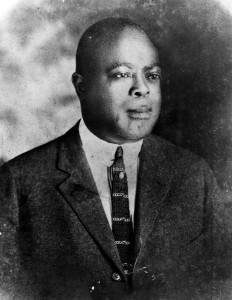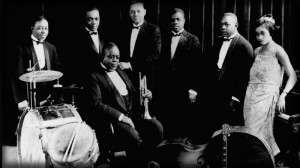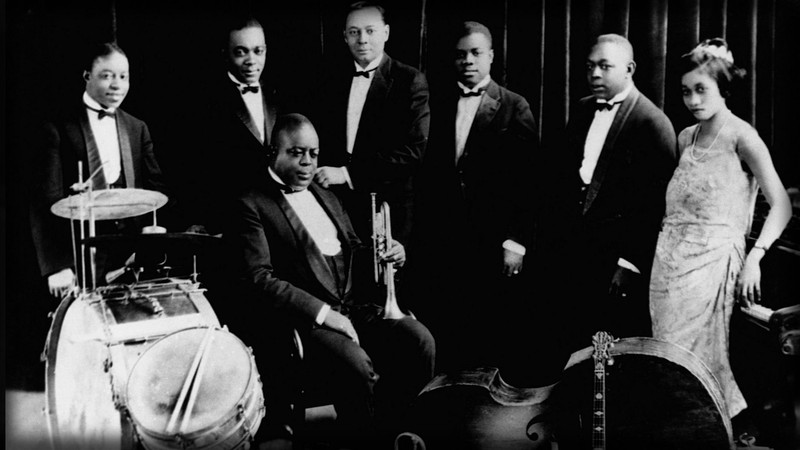
There was an EP of his amongst my father’s records, so I must have first come across King Oliver on one of those blank mid-1980s summer afternoons when everyone else was out and there was nothing else to do.
There’s always a sense of curtailment about a parent’s record collection. At least, there was with all of mine (various post-1967 divorces mean that I’m talking about at least four people and four collections). They were small, with no more than about ten LPs in each case. Each collection contained signs of incipient interest in something: Miles Davis, or the musical Hair, or perhaps something classical, hung around the usual random core of records that litter the cupboards of the essential unenthusiast. In every instance, record buying stopped dead on the wedding day, save for the odd record bought to feed the old broken record player’s replacement.
The general rule in every one of my family’s outposts was that you owned a record player but you only used it at Christmas, if then. Music, for the men of the family, was for the car. For the wives, it came out of a radio in the kitchen. After 1975, everything was cassettes. The LPs from that forgotten earlier life when music briefly promised to be more than this stayed, leaning up against each other, in a cupboard, like so many old photo albums, waiting for the curious to rediscover them.
Which must have been how I came across King Oliver. When I did, even I, knowing nothing, could tell he was different.
It was all in the photograph on the cover. Jazz coincided with the arrival of photography as a young art in a hurry, with the consequence for us that the pioneers are captured in the sort of compelling, dare I say iconic, stills that would characterize music until the ’73 Oil Crisis.
Not so King Oliver. In photographic terms, the poor man is the runt of the jazz family, perpetually caught with the wrong expression or tucked away behind more confident cousins. Even when photographed with his greatest post-1918 band, he’s caught with his eyes closed:

The great jazz photographs of the 1920s on give out the impression that all that beauty and energy has done no more than gone away for a few minutes, and is about to return in strength to sweep in and brush our lesser reality away. All that hides it is a thin screen, which it can punch through at will.
Not so with King Oliver. His poorly preserved, badly composed, unencompassing images distance him from us. Something is dragging him back away into the past, and he is receding from us faster and faster.
It doesn’t help that his greatest post-1918 band – King Oliver’s Creole Jazz Band, featuring of course the young Louis Armstrong, flourished frustratingly close to, but never within, the electric recording era. The three mechanical recordings above – Dippermouth Blues, Canal Street Blues and Chimes Blues – were the ones I heard on my father’s record, played with delicious surreptitiousness out over the crusty bread and margarine into the bland Surrey sunshine. They’re terrific, and the recordings have atmosphere, but also a sense that the passage of time is turning the volume down by stages, and that soon we won’t be able to hear them at all.
It’s well known that Oliver’s own personal and business weaknesses pulled him down before his time. But he was ageing by the time Louis Armstrong came into his destiny (Joe Oliver is thought to have been either 35 or 39 in 1920) and the Kid Ory years of the 1910s are the ones you might have wanted to hear to catch Oliver at his peak. The end is Bessie Smith sad, Oliver dying a janitor unable to afford the medical care that could have extended his life.
But there are some electric recordings – opportunities for those came along sporadically, and a number survive, of which this is just about my favourite. It’s West End Blues, recorded in the same year as the Louis Armstrong superlative classic – like the Armstrong, it’s a reflective, meditative recording, but Oliver (who did write the thing after all) brings quite different feelings from a relatively similar sound.
ddd

Sorry, James, but that West End Blues seemed to me to be just a copy of Armstrong’s. So I clicked through and one of the commenters agreed. He says that the recording you want is this one:
http://www.youtube.com/watch?v=dOzl0JtT_m0&feature=player_embedded
Actually, “the recording you want” is for you to judge, not me. Would you accept an apology and a “perhaps” inserted?
They’re both thoroughly interesting recordings so taste does come into it. I come down – very narrowly indeed – on the side of the version I posted, merely because the copying-Armstrong thing interests me, but I’d probably yield to your contribution being the better work of art by some margin!